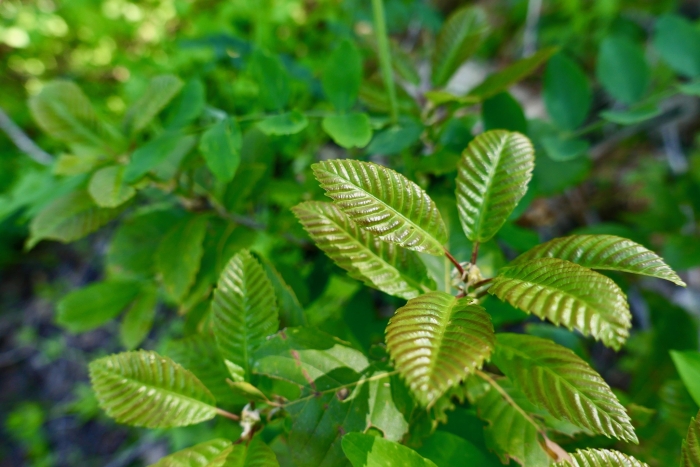Sadler’s Oak
(Quercus sadleriana)
Sadler’s Oak (Quercus sadleriana)
/
/

paulexcoff
CC BY-SA 4.0
Image By:
paulexcoff
Recorded By:
Copyright:
CC BY-SA 4.0
Copyright Notice:
Photo by: paulexcoff | License Type: CC BY-SA 4.0 | License URL: http://creativecommons.org/licenses/by-sa/4.0/ | Rights Holder: paulexcoff | Publisher: iNaturalist | Date Created: 2022-06-23T16:55:22-07:00 |





















Estimated Native Range
Summary
Quercus sadleriana, commonly known as Sadler’s oak or deer oak, is an evergreen shrub native to the serpentine soils in the chaparral and coniferous forests of the Klamath Mountains in southwestern Oregon and far northern California. It typically grows to heights of 3.5 to 10 feet and can spread widely with its rhizomatous growth habit, forming dense thickets. The leaves of Sadler’s oak are distinctive, resembling those of chestnut trees, being oval with toothed edges and a glossy, leathery texture. This species is adapted to its native harsh environments, characterized by poor, rocky soils and occasional wildfires.
Sadler’s oak is valued for its ability to thrive in challenging conditions, making it suitable for use in restoration projects and native plant gardens. It requires minimal maintenance once established and is drought-tolerant, reflecting its adaptation to the dry summer climate of its native range. In cultivation, it prefers full sun to partial shade and is best suited to well-drained soils, particularly those that mimic its native serpentine substrate. While not widely used in ornamental horticulture, its evergreen foliage and ability to form dense thickets make it a potential candidate for privacy screens or as a windbreak in appropriate regions. Gardeners should be aware that its spreading nature can be problematic if not managed.CC BY-SA 4.0
Sadler’s oak is valued for its ability to thrive in challenging conditions, making it suitable for use in restoration projects and native plant gardens. It requires minimal maintenance once established and is drought-tolerant, reflecting its adaptation to the dry summer climate of its native range. In cultivation, it prefers full sun to partial shade and is best suited to well-drained soils, particularly those that mimic its native serpentine substrate. While not widely used in ornamental horticulture, its evergreen foliage and ability to form dense thickets make it a potential candidate for privacy screens or as a windbreak in appropriate regions. Gardeners should be aware that its spreading nature can be problematic if not managed.CC BY-SA 4.0
Plant Description
- Plant Type: Tree, Shrub
- Height: 3-20 feet
- Width: 3-20 feet
- Growth Rate: Slow
- Flower Color: N/A
- Flowering Season: Spring, Summer
- Leaf Retention: Evergreen
Growth Requirements
- Sun: Part Shade
- Water: Low
- Drainage: Medium
Common Uses
Bee Garden, Bird Garden, Drought Tolerant, Low Maintenance
Natural Habitat
Native to chaparral and coniferous forests on serpentine soils in the Klamath Mountains
Other Names
Common Names: Sadler’s Oak
Scientific Names: , Quercus sadleriana,
GBIF Accepted Name: